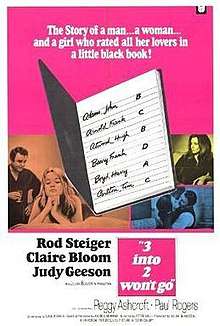Three into Two Won't Go
| Three into Two Won't Go | |
|---|---|
 Theatrical release poster | |
| Directed by | Peter Hall |
| Produced by | Julian Blaustein |
| Written by |
Andrea Newman Edna O'Brien |
| Starring |
Rod Steiger Claire Bloom Judy Geeson |
| Music by | Francis Lai |
| Cinematography | Walter Lassally |
| Edited by | Alan Osbiston |
Release date |
|
Running time | 92 minutes |
| Country | United Kingdom |
| Language | English |
| Budget | $1.5 million[1] |
Three into Two Won't Go is a 1969 British drama film directed by Peter Hall and starring Rod Steiger, Claire Bloom and Judy Geeson. The film was entered into the 19th Berlin International Film Festival.[2]
Plot
Steve and Frances Howard are a middle-aged, married couple unable to have children together. They have discussed adoption but made no decision: the subject is clearly difficult for them. They have purchased a large detached house on a newly-built luxury estate in Middlesex, England, and are starting to furnish and decorate it. Also to attend to the extensive, but empty, garden. She teaches English to GCE A-level students, he is a sales executive in an electrical appliance company, enjoying the regular driving his job entails.
Steve picks up a free-spirited teenage hitchhiker, Ella, and has a brief affair. To his considerable shock and surprise Ella turns up at his home whilst he is away and introduces herself to his wife Frances. After they become acquainted over several bottles of wine, she claims to be pregnant by another man, then begs to be allowed to stay for the weekend. Calculating and manipulative, when Steve returns and Frances is away Ella threatens to abort the baby, which she reveals is his. He begs her not to, but she refuses. Torn between his faltering love for his wife, his infatuation with Ella, and his unborn child, Steve finally agrees to leave his wife and set up home with Ella to have the baby together. Ella agrees, though without much enthusiasm, but specifies he should tell his wife when she (Ella) is not present.
Frances clearly suspects a secret relationship; her situation is further complicated by visits to her elderly mother, an emotionally repressed women who reveals the philandering nature of Frances' father. And how she endured their lifetime of marriage, and his habit of bringing lady 'friends' to their home, by shutting her mind to it. Frances discloses somebody her husband met, a young girl, is now staying with them. Resignedly, her mother tells her, 'You'll learn to live with it...'.
Steve meets Francis to tell her of his decision, but before he can she - knowing what he is about to say, and telling him not to - says she wants to adopt Ella's unborn baby. This is a surprise opportunity - for Steve to save his marriage and have a child; likewise for Frances. But he rejects the offer and says he is leaving to live with Ella. 'You bloody fool' she says, softly, as she leaves him. Frances fetches her mother to come and live in the house with her. Steve has arranged to meet Ella that evening, but she doesn't turn up. Returning to the house with her mother Frances finds Ella there. After shepherding the mother away, Ella tells Frances she is not now pregnant. Steve arrives, unaware of this latest development, and Ella tells him she has changed her mind. After tense exchanges Steve agrees to seek a divorce. Frances leaves with her mother to find a hotel. Steve packs a suitcase and leaves too. Ella is now seemingly in possession of the house, having in the meantime destroyed a marriage...
Cast
- Rod Steiger as Steve Howard
- Claire Bloom as Frances Howard
- Judy Geeson as Ella Patterson
- Peggy Ashcroft as Belle
- Paul Rogers as Jack Roberts
- Lynn Farleigh as Janet
- Elizabeth Spriggs as Marcia
- Sheila Allen as Beth
- Diana Webster
Reception
Box office
The film was the 19th most popular film at the UK box office in 1969.[3]
US version
In 1970 a version of the film screened on NBC in the US. Hall, O'Brien and Newman demanded their names be taken off the film alleging 20 minutes of new footage had been shot and added.[4]
References
- ↑ Alexander Walker, Hollywood, England, Stein and Day, 1974 p345
- ↑ "IMDB.com: Awards for Three into Two Won't Go". imdb.com. Retrieved 7 March 2010.
- ↑ "The World's Top Twenty Films." Sunday Times [London, England] 27 September 1970: 27. The Sunday Times Digital Archive. accessed 5 April 2014
- ↑ British Film Bowdlerized: Creators Demand Credits Removed By Alfred Frierdly. The Washington Post, Times Herald (1959-1973) [Washington, D.C] 28 October 1970: B1.